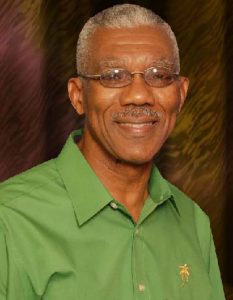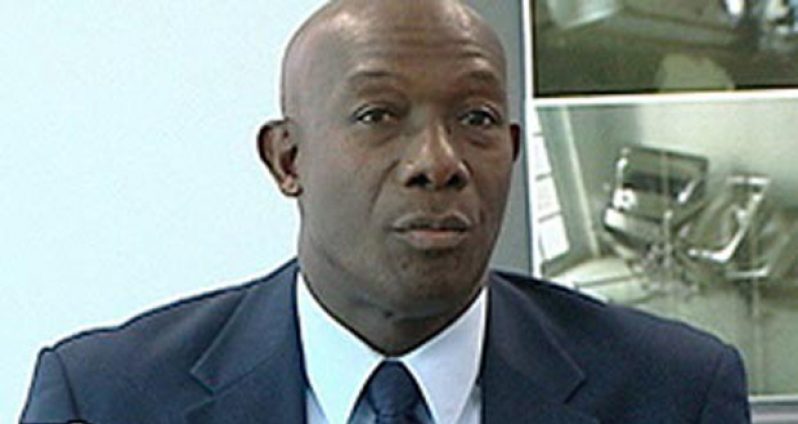ACCESSING Trinidad and Tobago’s petroleum as an alternative to Guyana’s PetroCaribe arrangement is high on this country’s agenda for discussion with the newly elected administration of the twin-island republic. On Thursday, President David Granger told reporters of the Guyana Chronicle and Stabroek News that Guyana is eager to work with the new administration of Trinidad and Tobago. “Trinidad is a very important partner within the Caribbean Community (CARICOM) and we want to see greater progress on the Caribbean Single Market and Economy,” he said. He noted that government

wants to see Guyana’s agenda with respect to agriculture being discussed with the new administration of Trinidad and Tobago.
“As you know our community food import bill is very large and we expect that Guyana particularly would be able to use this opportunity to export more agricultural commodities to Trinidad and Tobago and to Barbados.”
President Granger stressed that though Guyana relied on the PetroCaribe arrangement since 2005 for the supply of oil from Venezuela, “we cannot depend entirely on PetroCaribe for Venezuelan petroleum”.
“We would be sourcing petroleum from Trinidad as well,” he told reporters.
Venezuela’s claims
Recently, following ExxonMobil’s discovery of oil in the Liza-1 well in the Stabroek Block, approximately 120 miles offshore Guyana, Venezuela has expanded its claim to include Guyana’s Atlantic front.
This new area claimed by Venezuela includes Guyana’s Exclusive Economic Zone (EEZ), and also intrudes on the EEZ of Suriname, French Guiana, Barbados and a chain of other Caribbean islands.
ExxonMobil is a U.S.-based oil and gas company.
Venezuela’s latest claim came in the form of decrees by that country’s President, Nicolas Maduro. The first decree claims the waters that include the area where Exxon is drilling, in addition to the earlier claim of the Essequibo, which is two-thirds of Guyana’s land mass.
The second decree, which replaced the first, does not specify any coordinates in relation to boundaries, but makes clear that Venezuela is ready to use military force to defend its new maritime boundary.
Foreign Affairs Minister Carl Greenidge had contended that the claim by Venezuela to this country’s EEZ has no basis in international law, pointing out that the 1899 Tribunal Award had put to rest that country’s claim to the Essequibo.
Friendly relations
Meanwhile, the President added that Guyana has enjoyed friendly relations with the government of Trinidad and Tobago over the years, and as such, he expects no difference with the newly elected Prime Minister of the twin-Island republic.
“Friendly relations between Guyana and Trinidad have been traditional and we expect that under Dr Rowley these relations would continue,” he said.
President Granger could not state what percentage of oil Guyana hopes to access from Trinidad and Tobago. “That would be a matter for the Trinidad and Tobago government,” he said, noting that “the concessions offered by Venezuela were part of a bigger arrangement under the Bolivarian Alternative for the Americas (ALGA) and I am not sure that Trinidad will want to have a similar deal”.
Over the past few weeks, the Guyana Government has defended its move to source oil from Trinidad and Tobago, stating that it has to ensure there is no shortage of fuel here.
“It is the government’s commitment to ensure that there is a reliable and regular supply of fuel, to drive industry in this country, and we as a government will do what is necessary in the public interest, to ensure that the wheels of industry continue to turn,” said Minister of State Joseph Harmon.
Since 2005, Guyana has been purchasing fuel from Venezuela under the PetroCaribe arrangement, but on occasion there have been late shipments.
As a result, government said it must have an alternative arrangement in place to ensure that Guyana does not experience a fuel shortage.
“We have both arrangements in place, a standby arrangement, which we will utilise from Trinidad and Tobago, and the PetroCaribe arrangement, which is in place by contract,” Harmon told reporters.
PetroCaribe is an oil alliance of several Caribbean states and Venezuela whereby oil is purchased on condition of preferential payment.
In 2005, at the signing of the PetroCaribe arrangement, former Prime Minister of Guyana Sam Hinds questioned whether states that signed onto the PetroCaribe arrangement were required to source oil solely from Venezuela. At that time, Guyana was sourcing oil from Trinidad and Suriname.
By Ariana Gordon



.jpg)









